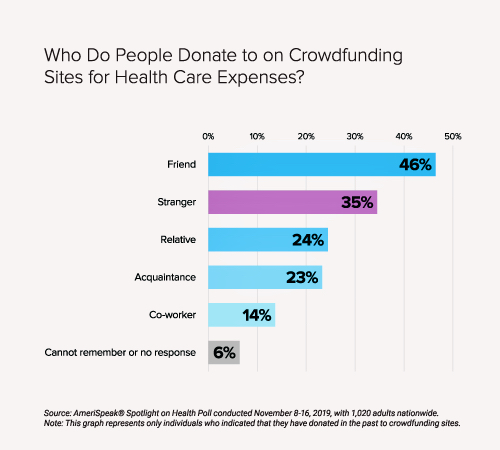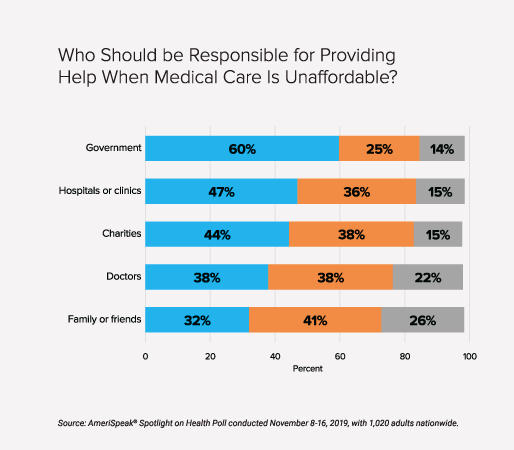Approximately 50 million—or 20 percent—of American adults reported donating to a crowdfunding campaign to help raise money for a medical bill or treatment.
CHICAGO, Feb. 19, 2020 — One in five Americans reported that they or someone in their household have contributed to a crowdfunding campaign to pay for medical bills or treatments, according to a new AmeriSpeak® Spotlight on Health survey from NORC at the University of Chicago. Crowdfunding is the process by which individuals may raise funds from a large amount of people, often through sites such as GoFundMe.
The survey also found that an estimated 8 million Americans had started a campaign for themselves or someone in their household and more than 12 million Americans had started a campaign for someone else.
“As annual out-of-pocket costs continue to rise, more Americans are struggling to pay their medical bills, and millions are turning to their social networks and crowdfunding sites to fund medical treatments and pay medical bills,” said Mollie Hertel, senior research scientist at NORC. “Although about a quarter of Americans report having sponsored or donated to a campaign, this share is likely to increase in the face of rising premiums and out-of-pocket costs.”
Americans who donated to a crowdfunding campaign were most likely to give money to a friend; however, a large percentage donated to someone they did not know personally.
Forty-six percent of respondents who donated did so to a friend’s crowdfunding campaign. Sixty-one percent donated to the campaign of either a relative, co-worker, or acquaintance (24 percent, 14 percent, and 23 percent, respectively). More than one-third (35 percent) donated to someone they did not know personally.

Almost two-thirds of Americans think that the government should bear a great deal or a lot of responsibility for providing health care to people who need free or reduced-cost medical care—more so than hospitals, doctors, or charities.
Although more people gained insurance coverage with the Affordable Care Act, crowdfunding for health care expenses is becoming more common because Americans still cannot afford their out-of-pocket costs—deductibles, copays, or coinsurance—their coverage notwithstanding. Medical bills remain the number one reason Americans file for personal bankruptcy, according to a 2019 City University of New York-Harvard study. When asked who is responsible for paying for care for those who cannot afford it, a majority of Americans (60 percent) believe the government should as opposed to health care providers, charities, and family and friends.

“It is clear that Americans want government and providers to work together to provide charity or assistance when needed,” said Susan Cahn, senior research scientist at NORC.” Fewer Americans think that family, friends, or even strangers should shoulder the costs of care that patients and their families cannot afford.
Furthermore, although we estimated that, to date, 8 percent of Americans have started crowdfunding campaigns, 26 percent believe friends or family should not assume much or any responsibility for unaffordable medical care costs.”
Methodology
The self-funded poll was conducted between November 8 and 16, 2019, during a monthly Omnibus survey. It included 1,020 interviews with a nationally representative sample (margin of error +/- 4.06 percent) of adult Americans age 18+ using the AmeriSpeak Panel. AmeriSpeak® is NORC’s probability-based panel designed to be representative of the U.S. household population. A comprehensive listing of all study questions, tabulations of top-level results for each question, and detailed methodology is available here.
About the AmeriSpeak Spotlight on Health
NORC at the University of Chicago’s AmeriSpeak Spotlight on Health is a series of quick-hitting national surveys on issues vital to health and well-being, conducted using AmeriSpeak’s probability-based panel.
About NORC at the University of Chicago
NORC at the University of Chicago is an objective, non-partisan research institution that delivers reliable data and rigorous analysis to guide critical programmatic, business, and policy decisions. Since 1941, NORC has conducted groundbreaking studies, created and applied innovative methods and tools, and advanced principles of scientific integrity and collaboration. Today, government, corporate, and nonprofit clients around the world partner with NORC to transform increasingly complex information into useful knowledge.
www.norc.org


